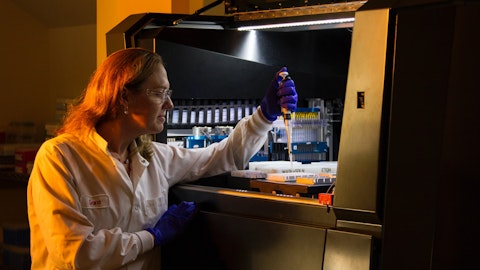Kelly McKee: Well, yeah you’ve just asked the two questions that we’re going to be curious to hear from the FDA about. We don’t really know right now what they’re going to require in order for us to be granted an accelerated approval. We have some estimates from some of our consultants that range anywhere from 80 to 120 patients. But whether that’s really what they’re thinking right now. We don’t know. And in terms of what sort of endpoints or what sort of readouts. Again, we don’t know what the emphasis is going to be, whether it’s going to be sort of tumor response in terms of shrinkage, whether it’s going to be a quality of life measure, some combination of that. We really don’t know what they’re going to require. And between now and our meeting with the FDA, we’re going to solicit input from a number of regulatory specialists that have been working in this area to give us some thoughts and recommendations about what to present and what to propose.
Joanne Lee: Got it. Appreciate you taking all the time to provide updates. Congrats again on the quarter.
Operator: Our next question comes from Robert LeBoyer with Noble Capital Markets. Please state your question.
Robert LeBoyer: Good afternoon. I was hoping that you could discuss some of the things in the Gedeptin trial and specifically the use of the checkpoint inhibitors that was mentioned earlier. It was a mention of the dosing regimen, but I was curious as to whether you were going to have separate arms for the checkpoint inhibitors for all patients or how you are going to go about testing it, but either a testing Gedeptin either alone or in combination?
Kelly McKee: Yeah. So, well, I mean, fundamentally, we don’t have a study design specifically in mind at this point in time. However, we recognize the potential that adding a checkpoint inhibitor offers to a therapy like Gedeptin. I mean, they’re sort of biologically plausible rationale for doing this. And there are other therapeutic agents in trials in head and neck cancer that are sort of capitalizing on this concept at the present time. So we have some ideas about how to go about doing this, but we don’t have any specific design in mind at this time. The preclinical work that’s ongoing is with our collaborators at Emory University in which they’ve demonstrated in animal models, some very encouraging results, which I think are going to support moving forward and how to move forward.
Our thinking at this time and this is not meant to commit us in any way. But our thinking at this time is that offering Gedeptin plus a checkpoint in the context of new adjuvant therapy is a very appealing approach and we intend to explore that extensively as we discuss taking the program down the road in multiple different directions.
Robert LeBoyer: Okay. Thank you very much.
Operator: Thank you. Our next question comes from Kumar Raja with ROTH Capital. Please state your question.
Kumar Raja: Thanks for taking my questions. So first one with regard to the MUC1 IND filing, what needs to be done there before and also the timing. And with regard to the Gedeptin trial, what are you seeing in terms of screen failure rate? And what should we expect in terms of data at ASCO?
Kelly McKee: Well, I’ll take the Gedeptin one and then Mark will address the MUC1 question. But so we’re not presenting anything at ASCO. We are — I’m going to be go into that meeting and avail myself of the opportunity to interact with many of the key opinion leaders in the head and neck cancer field, to pick their brains to see sort of see what the state of the art is with using sort of therapeutic interventions either alone or in conjunction with checkpoint inhibitors and other immunologic sort of I won’t — I don’t want to say adjuvants, but, combination of with other immunologic simulators, stimulants. And so there’s no data that’s going to be presented at ASCO because we don’t really have a complete data set be able to present. And what was your other question about Gedeptin before I give it back to Mark?


